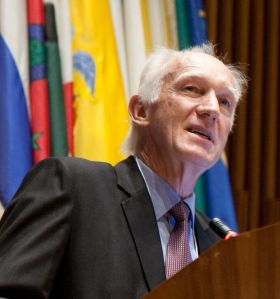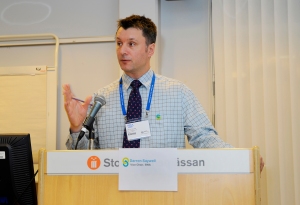 For Piers Cross, Special Advisor to Sanitation and Water for All, the 2013 Stockholm Water Week was heavy with history.
For Piers Cross, Special Advisor to Sanitation and Water for All, the 2013 Stockholm Water Week was heavy with history.
My Generation
The Stockholm World Water Prize this year was awarded to Peter Morgan for the genius of his innovations in on-site sanitation, ecological sanitation and water devices for rural Africa, developed over 4 decades. It was his innovations that bred the confidence that creating clean water and a hygienic environment for everyone forever might be achievable. A big idea in the 1970s.
Peter was a great Stockholm Water Prize awardee. It could not have happened to a more deserving, genuine or humble man. Seeing him in his tuxedo, beard all trimmed was a bit of a shock. No shorts, no dusty veldskoens, no notebook in his top pocket. His speeches were modest and accessible, reflecting a life’s love of Africa and his commitment to simplicity and mother earth. As he generously reflected, the award was also recognition of the fellow-travellers of that era. I found it very emotional: the award honoured a generation.
A Long and Winding Road
Peter’s inventions enabled a vision in which millions of rural African families, just as they built and repaired their homes, could get fresh water for domestic use and water their gardens and animals. It was not to be, this rural idyll, emerging from Southern Africa’s inglorious past, was devastated by another corrupt political class, which destroyed the economy and plunged rural Zimbabweans back into poverty, cholera, hardship and indignity.
Keep on Truckin’
It was also a week with another historic landmark: Malin Falkenmark’s last World Water Week; another selfless and incisive mind that changed the thinking of a generation. Malin has been the intellectual inspiration of Stockholm’s World Water Week since its inception. As Torkil Jens-Clausen observed, not only did she set the norms for water management, but her vision of managing blue and green water flows and her analysis of the interactions between land and water, changed the way we think about water. She also mastered the inspirational water sound-bite. In her last closing address she produced another wonderful image:“water is the bloodstream of the biosphere”. Malin retired in 1991. I’ll say that again: she retired in 1991. And then had two more decades of saving the planet. Fling off the shackles and retire early, I say.
Come Together
Co-operation was the word in the family this week: an echo over many decades. In March 1977, thirty-six years ago, the first United Nations Water Conference in Mar Del Plata, Argentina, reported that participants committed themselves to “increased international co-operation” and called on UN agencies to increase mutual co-operation and to better support governments. Who was the rapporteur that day? Malin Falkenmark.
Water is integral to so many life-strands – health, food, ecology, energy. Co-operation between the strands of this many-headed hydra is no mean task. The list of water uses is endless, though our water resources are not. Water is the element that connects us all. As the closing speakers concluded: water is the nexus.
Bridge Over Troubled Water
So what’s new? As the future global development framework is being shaped, there is now a concerted effort for the water community to build momentum for a specific water Sustainable Development Goal whilst also developing water targets in energy, food production, nutrition and growth. Ironically, co-operating with other sectors may be water’s best shot at getting the recognition it deserves.
Jumpin’ Jack Flash
The sanitation and water service delivery sector is taking co-operation a significant step forward by establishing an accountability framework. This framework – the Sanitation and Water for All partnership – is supported by a growing number of partners (nearly a hundred so far) from across the world. Its central hypothesis, its theory of change, is that: giving sanitation and water a higher political priority, a clear evidence base and sound country processes will generate more attention and resources for WASH and create a larger and more measurable impact from investment. Showing more impact should ignite a virtuous cycle- a rolling stone gathering moss – building momentum to reach sustainable universal access to water and sanitation.
So what does this mean in non-development-speak? The idea is to replicate some of the great success stories. Nelson Mandela’s government decided in the 90s to build the water infrastructure that was never built during apartheid. Political will resulted in a huge increase in sector financing and the government was held to account by a new electorate. Similarly, the President of Rwanda lead the clean-up of his country and to the situation where Rwanda is probably the only poor country in Africa to have met the sanitation MDG.
So if leaders in, say, Liberia, Ghana, Benin or Kenya made high-level commitments to address open defecation, improve rural water maintenance, provide services to informal settlements, they would be held to account and other SWA partners would commit to help them to achieve these goals. SWA is a bold set of ideas and will be tested at the next High-level meeting to be held in April 2012.
Stand By Me
At the heart of this accountability framework is the recognition – so sharply brought into focus by the tragedy in Zimbabwe – that good governance is our best assurance that services will be sustained. Integral to sustainability is the growing consensus that strong country systems, reaching down to the local level, are essential for sanitation and water services to last. This means coming together behind country leadership and good governance. A sign of maturity in the week was the recognition that we need to be more honest and open about failures and better analyse blockages. The information age, spatial planning, mobile to web technology, social networking can undermine power asymmetry, empower stakeholders and help target inequity to give us all a safe water future.
I left Stockholm hugely optimistic for the water sector.

